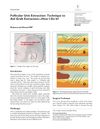 1 citations,
June 2017 in “Journal of the American Academy of Dermatology”
1 citations,
June 2017 in “Journal of the American Academy of Dermatology” Oral tofacitinib may be an effective and tolerable treatment for some people with severe alopecia areata.
 October 1987 in “Clinics in Dermatology”
October 1987 in “Clinics in Dermatology” Hair transplantation is beneficial if the right patients are chosen and the procedure is done carefully.
4 citations,
December 2022 in “Infection and Drug Resistance” Fire needle therapy is an effective and better alternative to surgery for early-stage neck carbuncles.
 September 2024 in “Journal of Cosmetic Dermatology”
September 2024 in “Journal of Cosmetic Dermatology” Follow these guidelines to safely and effectively use energy-based devices in aesthetic treatments.
 4 citations,
January 2019 in “PubMed”
4 citations,
January 2019 in “PubMed” Patterned hair loss in women is linked to hormonal imbalances and biochemical changes, and should be evaluated for underlying health issues.

Injecting a person's own skin cells back into their skin is a promising, safe, and affordable treatment for skin disorders.
January 2018 in “Journal of Visualized Experiments” PRP injections significantly increased hair count and density with less pain.
 April 2005 in “AORN Journal”
April 2005 in “AORN Journal” The document concludes that the books are useful for healthcare leaders, providing practical tips and inspiration for industry challenges.
 8 citations,
March 2009 in “Aesthetic Plastic Surgery”
8 citations,
March 2009 in “Aesthetic Plastic Surgery” The "flying-wings" scalp flap technique is a simple, safe, and effective way to reconstruct large areas of scalp loss in children.
 7 citations,
May 2019 in “Acta Orthopaedica et Traumatologica Turcica”
7 citations,
May 2019 in “Acta Orthopaedica et Traumatologica Turcica” Hair tourniquet syndrome in infants can be treated successfully with immediate hair removal.
 11 citations,
August 2018 in “Asian-Australasian journal of animal sciences”
11 citations,
August 2018 in “Asian-Australasian journal of animal sciences” Short daily photoperiods improve cashmere production in Inner Mongolia white cashmere goats.
 June 2006 in “The American Journal of Cosmetic Surgery”
June 2006 in “The American Journal of Cosmetic Surgery” Advancements in cosmetic and reconstructive surgery improve techniques and patient satisfaction.
 January 1982 in “Journal of The American Academy of Dermatology”
January 1982 in “Journal of The American Academy of Dermatology” Experts discussed treatments for skin conditions in children, emphasizing hydration, cautious medication use, and early intervention for infections.
 December 2020 in “Lasers in Surgery and Medicine”
December 2020 in “Lasers in Surgery and Medicine” Laser safely and effectively removes unwanted scalp micropigmentation.
36 citations,
December 2014 in “F1000 prime reports” The document concludes that Hidradenitis suppurativa is often underdiagnosed, lacks definitive treatment, and requires better awareness and management strategies.
March 2024 in “Cosmetics” New regenerative techniques show promise for improving skin, healing wounds, and growing hair.
 4 citations,
March 2002 in “Hair transplant forum international”
4 citations,
March 2002 in “Hair transplant forum international” Using tumescent anesthesia in hair restoration surgery is safe and effective for long-lasting scalp numbness and reducing bleeding.
 15 citations,
March 2012 in “International journal of nanomedicine”
15 citations,
March 2012 in “International journal of nanomedicine” Local injections of nanosized rhEPO can speed up skin healing and improve quality after deep second-degree burns.
 1 citations,
January 2010 in “Elsevier eBooks”
1 citations,
January 2010 in “Elsevier eBooks” The document concludes that local flaps are effective for reconstructive surgery in the head and neck, offering good skin match and function.
 5 citations,
November 1999 in “Medical Hypotheses”
5 citations,
November 1999 in “Medical Hypotheses” Minoxidil, a common hair loss treatment, might work by counteracting a hormone that reduces hair growth and promotes hair loss.
 January 2022 in “Journal of Cutaneous and Aesthetic Surgery”
January 2022 in “Journal of Cutaneous and Aesthetic Surgery” Using truncal anesthesia on the supraorbital nerve reduces pain in hair loss treatments and improves patient comfort.
2 citations,
February 2020 in “Chinese Medical Journal” Undiagnosed lupus can cause severe complications after epidural anesthesia, leading to muscle weakness and potentially death.
 November 2016 in “Therapeutic Delivery”
November 2016 in “Therapeutic Delivery” New drugs for Alzheimer's and rheumatoid arthritis advanced, a Zika vaccine is in development, and there were business deals in anesthesia and oncology.
 9 citations,
August 2008 in “Journal of Oral and Maxillofacial Surgery”
9 citations,
August 2008 in “Journal of Oral and Maxillofacial Surgery” A woman experienced temporary hair loss after jaw surgery, which can be reduced by careful head positioning during the operation.
 6 citations,
September 2017 in “The American Journal of Cosmetic Surgery”
6 citations,
September 2017 in “The American Journal of Cosmetic Surgery” Dr. Muhammad Ahmad's technique improves hair transplant success by increasing space between hairs and adjusting their angle to reduce damage and skin removal during extraction.
 17 citations,
May 2013 in “Oral and Maxillofacial Surgery Clinics of North America”
17 citations,
May 2013 in “Oral and Maxillofacial Surgery Clinics of North America” The document concludes that careful surgical methods and choosing the right materials are key for successful scalp, skull, and frontal sinus reconstruction.
 3 citations,
July 2018 in “Journal of Oral and Maxillofacial Surgery”
3 citations,
July 2018 in “Journal of Oral and Maxillofacial Surgery” Hair loss can occur after oral surgery, likely due to stress and pressure on the scalp, and usually gets better on its own.

Local flaps are effective for covering small to large scalp and forehead defects with good cosmetic results.

A spayed dog with vaginal bone structures causing infection was successfully treated by removing the bones and administering medication.
 July 2018 in “Journal of Oral and Maxillofacial Surgery”
July 2018 in “Journal of Oral and Maxillofacial Surgery” Oral and maxillofacial surgery has advanced with fluoride reducing tooth decay and high-speed handpieces aiding in more aesthetic procedures, leading to changes in practice and training.

























